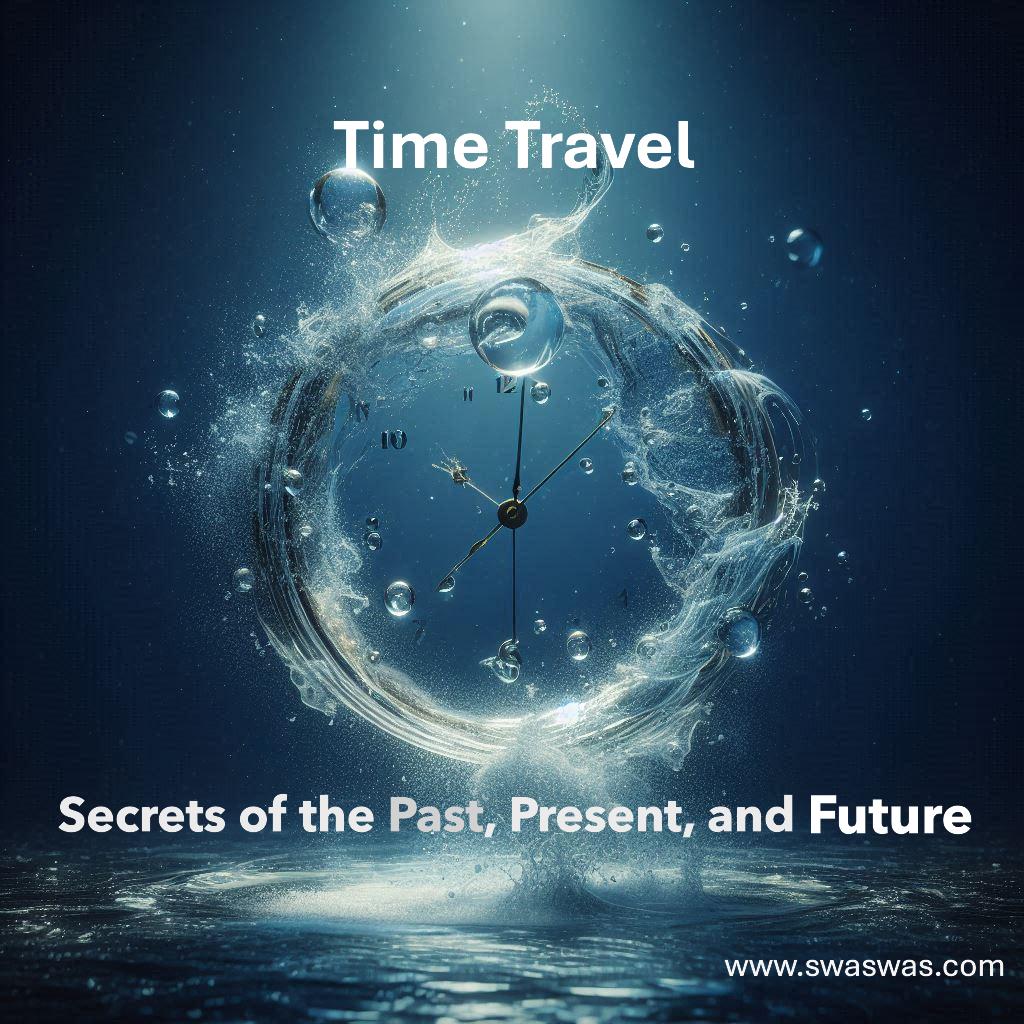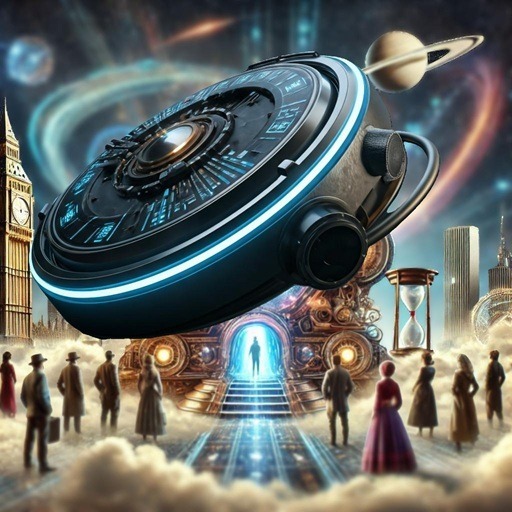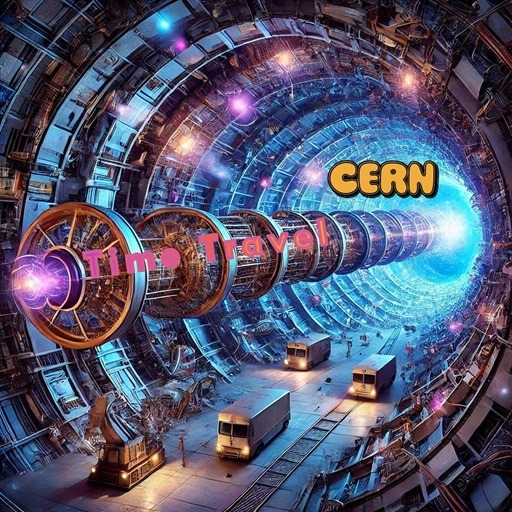The Novikov Self-Consistency Principle is a captivating idea from the world of theoretical physics and time travel. It suggests that if time travel were possible, anything a time traveler does in the past would already align with the history we know. This means the universe naturally avoids contradictions, solving famous time travel puzzles like the “grandfather paradox.” By examining this principle, we explore the fascinating connections between cause and effect, determinism, and the very fabric of time.
Introduction to Time Travel Paradoxes
Time travel has long been a staple of science fiction, captivating audiences with its tantalizing possibilities and mind-bending implications. However, beyond the realm of fiction, time travel presents a series of profound theoretical challenges that have intrigued physicists, philosophers, and logicians for decades. These challenges are encapsulated in what are known as time travel paradoxes—scenarios that seem to defy logic and challenge our understanding of causality, determinism, and the nature of time itself. In this section, we will explore some of the most famous time travel paradoxes, setting the stage for a deeper understanding of the complex temporal challenges that arise when we consider the possibility of moving through time.
The Grandfather Paradox
One of the most well-known time travel paradoxes is the grandfather paradox. Imagine a time traveler who goes back in time and accidentally (or intentionally) prevents their grandfather from meeting their grandmother. If the grandfather and grandmother never meet, the time traveler’s parent would never be born, and consequently, the time traveler themselves would never exist. But if the time traveler never exists, how could they have gone back in time to prevent their grandparents from meeting in the first place? This paradox creates a logical loop that seems impossible to resolve.
The grandfather paradox highlights the fundamental problem of causality in time travel. Causality is the principle that cause precedes effect—that every event is the result of a preceding cause. In our everyday experience, causality is a straightforward concept: you drop a glass (cause), and it shatters (effect). But in the context of time travel, causality can become tangled, leading to situations where an effect seems to negate its own cause.
The Bootstrap Paradox
Another intriguing time travel paradox is the bootstrap paradox, which involves an object or piece of information that is sent back in time and becomes the cause of itself. For example, imagine a time traveler who goes back in time and gives Shakespeare a copy of his own works. Shakespeare then publishes these works, which are later discovered by the time traveler, who then takes them back in time to give to Shakespeare. In this scenario, the works have no original author—they simply exist in a loop, with no clear point of origin.
The bootstrap paradox challenges our understanding of origin and creation. It raises questions about where things come from and how they come into existence. If an object or piece of information can exist without a clear origin, what does that mean for our understanding of reality? This paradox also touches on the concept of determinism—the idea that all events are predetermined and that the future is fixed. If the future is fixed, then any attempt to change it through time travel would be futile, as the events would already be determined to happen in a certain way.
The Predestination Paradox
The predestination paradox is closely related to the bootstrap paradox and involves a time traveler who inadvertently causes an event to happen by trying to prevent it. For example, imagine a time traveler who goes back in time to prevent a tragic accident. In the process of trying to prevent the accident, the time traveler inadvertently causes it to happen. The accident was always going to happen, and the time traveler’s actions were part of the chain of events that led to it.
This paradox raises questions about free will and determinism. If the future is fixed, do we have any real control over our actions, or are we simply playing out a predetermined script? The predestination paradox suggests that even if time travel were possible, our actions might be constrained by the very events we are trying to change.
The Ontological Paradox
The ontological paradox is a broader category that includes the bootstrap and predestination paradoxes. It deals with the nature of existence and the origin of things. In the context of time travel, the ontological paradox arises when an object, person, or piece of information exists without a clear origin. This paradox challenges our understanding of reality and raises questions about the nature of existence itself.
For example, imagine a time traveler who brings a futuristic piece of technology back in time. The technology is then reverse-engineered and developed over time, eventually leading to the creation of the very same technology that the time traveler originally brought back. In this scenario, the technology has no clear origin—it simply exists in a loop, with no beginning or end.
Mathematical Implications of Time Travel Paradoxes
Time travel paradoxes are not just philosophical curiosities—they also have significant mathematical implications. In particular, they challenge our understanding of causality and the structure of spacetime. In the framework of general relativity, spacetime is a four-dimensional continuum that combines the three dimensions of space with the dimension of time. The equations of general relativity allow for the possibility of closed timelike curves (CTCs), which are paths through spacetime that loop back on themselves, allowing for the possibility of time travel.
However, the existence of CTCs raises serious questions about the consistency of physical laws. If time travel were possible, how could the laws of physics remain consistent in the presence of paradoxes like the grandfather paradox or the bootstrap paradox? One approach to resolving these paradoxes is to consider the Novikov Self-Consistency Principle, which we will explore in the next section.
What is the Novikov Self-Consistency Principle?
The Novikov Self-Consistency Principle is a theoretical framework proposed by Russian physicist Igor Dmitriyevich Novikov in the 1980s. It addresses the logical and physical challenges posed by time travel, particularly the paradoxes that arise when considering the possibility of traveling to the past. At its core, the principle asserts that any actions taken by a time traveler in the past must be consistent with the history that has already been observed. In other words, the universe operates in such a way as to prevent contradictions, ensuring that any attempt to alter the past would ultimately result in events that are already part of the historical record.
Basic Definition and Core Concept
The Novikov Self-Consistency Principle can be succinctly defined as follows: If time travel to the past is possible, then any actions taken by a time traveler must be consistent with the events that have already occurred. This means that any attempt to change the past would be inherently self-defeating, as the universe would naturally adjust to ensure that the timeline remains consistent.
To understand this principle, consider the grandfather paradox once again. According to the Novikov Self-Consistency Principle, if a time traveler were to go back in time and attempt to prevent their grandfather from meeting their grandmother, the universe would somehow ensure that the attempt fails. Perhaps the time traveler would be unable to carry out the action, or some other event would intervene to preserve the timeline. In this way, the principle eliminates the possibility of paradoxes by enforcing a kind of “cosmic censorship” that maintains the consistency of history.
The Fundamental Problem of Time Travel Logic
The fundamental problem of time travel logic is the potential for paradoxes—situations where the normal rules of cause and effect break down, leading to logical inconsistencies. The Novikov Self-Consistency Principle addresses this problem by proposing that the universe has a built-in mechanism to prevent such inconsistencies. This mechanism ensures that any actions taken in the past are already accounted for in the present, effectively making the timeline self-consistent.
To illustrate this concept, let’s consider a mathematical analogy. Imagine the timeline as a function f(t)f(t), where tt represents time, and f(t)f(t) represents the state of the universe at time t. If a time traveller were to go back to a previous time t0t0 and take some action, the result of that action would be reflected in the function f(t)f(t) at all subsequent times. The Novikov Self-Consistency Principle asserts that the function f(t)f(t) must be continuous and self-consistent—that is, the value of f(t)f(t) at any time tt must be consistent with the values at all other times.
In mathematical terms, this can be expressed as:

where dfdtdtdf represents the rate of change of the universe’s state over time. The integral ensures that the state of the universe at any time tt is determined by its state at a previous time t0t0 and the actions taken in between. The Novikov Self-Consistency Principle requires that this integral be consistent with the observed history, preventing any contradictions or paradoxes.
Implications for Causality and Determinism
The Novikov Self-Consistency Principle has profound implications for our understanding of causality and determinism. Causality, as we normally understand it, is the principle that cause precedes effect—that every event is the result of a preceding cause. Determinism is the idea that all events are predetermined and that the future is fixed. The Novikov Self-Consistency Principle suggests that both causality and determinism are preserved in the presence of time travel, as the universe ensures that any actions taken in the past are consistent with the future that has already been observed.
This principle also raises questions about free will. If the universe enforces consistency in the timeline, does that mean that our actions are predetermined? Or do we still have the freedom to make choices, with the universe simply adjusting to ensure that those choices are consistent with the timeline? These are deep philosophical questions that the Novikov Self-Consistency Principle brings to the forefront.
The Man Behind the Principle: Igor Dmitriyevich Novikov
Brief Biographical Background
Igor Dmitriyevich Novikov, a name synonymous with groundbreaking theories in astrophysics and cosmology, has left an indelible mark on the scientific community. Born on November 10, 1935, in Moscow, Soviet Union, Novikov grew up in a society heavily influenced by rapid advancements in science and technology. His formative years coincided with the height of the Soviet scientific renaissance, fostering a deep curiosity for the mysteries of the universe.
Novikov’s academic journey began at the prestigious Moscow State University, where he studied physics. His intellectual prowess and keen interest in cosmology propelled him toward a career in theoretical physics. Under the mentorship of luminaries like Yakov Zeldovich, Novikov flourished, contributing to the Soviet Union’s leadership in astrophysical research during the mid-20th century. His ability to tackle complex problems with clarity and originality earned him a place among the leading minds of his time.
Beyond his professional achievements, Novikov’s passion for science extended to education and outreach. He authored several books aimed at making complex astrophysical concepts accessible to a broader audience, inspiring a generation of scientists and enthusiasts alike.
Scientific Contributions to Theoretical Physics
- Black Hole Physics Novikov’s contributions to black hole physics have been pivotal in advancing our understanding of these enigmatic objects. Alongside Zeldovich, he explored the theoretical foundations of black hole accretion disks, which are structures formed by matter spiraling into a black hole. This work provided critical insights into the emission of radiation from these disks, laying the groundwork for observational studies of black holes.
- Cosmology and the Big Bang Theory Novikov’s work extended to the origins and evolution of the universe. He was a proponent of the Big Bang theory and contributed to the understanding of the early universe’s physical conditions. His research on the cosmic microwave background radiation offered key insights into the relic radiation left over from the Big Bang, further solidifying the theory’s validity.
- The Novikov Self-Consistency Principle Perhaps his most famous contribution is the Novikov Self-Consistency Principle, a theoretical framework addressing the paradoxes of time travel. This principle posits that if time travel is possible, the events resulting from such travel must be consistent with the already established history of the universe. This groundbreaking idea brought clarity to a topic often plagued by logical inconsistencies and sparked discussions across physics, philosophy, and popular culture.
- Gravitational Waves Novikov was also an early advocate for the study of gravitational waves, ripples in spacetime caused by massive accelerating objects. His theoretical predictions, combined with those of his contemporaries, paved the way for the eventual detection of gravitational waves by the LIGO and Virgo collaborations in the 21st century, a milestone in physics.
Legacy and Influence
Novikov’s work has had a profound impact not only on theoretical physics but also on the way we conceptualize time, space, and causality. His contributions to the understanding of black holes, the Big Bang, and time travel continue to influence scientific research and inspire new generations of physicists. Through his books and papers, Novikov has ensured that his legacy transcends the boundaries of academia, reaching anyone curious about the universe’s mysteries.
Time Travel and Causality: The Central Dilemma
Explaining the Grandfather Paradox
The idea of time travel has captivated human imagination for centuries, offering tantalizing possibilities and profound dilemmas. One of the most well-known challenges in time travel is the “grandfather paradox,” a thought experiment that highlights the logical inconsistencies arising from altering the past.
The paradox unfolds as follows: Imagine a time traveler journeys to the past and interferes with their grandfather’s life before he has children, perhaps even preventing his existence. If the grandfather never has children, the time traveler—a descendant—would never be born. But if the time traveler doesn’t exist, how could they travel back in time to interfere in the first place? This circular logic creates a paradox, challenging the very notion of cause and effect.
The grandfather paradox exposes the fragility of our understanding of time and causality. It raises fundamental questions: Can the past be changed? If so, how would the universe resolve these contradictions?
Why Traditional Time Travel Scenarios Create Logical Inconsistencies
Traditional depictions of time travel often assume a linear timeline where events occur in a fixed sequence of cause and effect. Introducing the possibility of altering past events disrupts this linearity, leading to logical inconsistencies like the grandfather paradox. Here are some reasons why traditional time travel scenarios create such dilemmas:
- Violation of Causality Causality—the principle that a cause precedes its effect—is a cornerstone of our understanding of the universe. Time travel that allows changes to the past violates this principle, as the effect (the time traveler’s actions) influences the cause (the circumstances leading to their existence). This reversal undermines the logical structure of events.
- Infinite Loops and Contradictions Traditional time travel scenarios often lead to infinite loops, where the same sequence of events repeats indefinitely without resolution. For instance, consider a scenario where an inventor builds a time machine after being inspired by a future version of themselves who provided the blueprints. Who, then, is the original inventor? Such loops defy logical explanation.
- Conservation of Information Time travel can lead to situations where information appears out of nowhere, violating the principle of conservation of information. For example, if a time traveler gives Shakespeare the text of “Hamlet,” which Shakespeare then publishes as his own work, where did the play originate? This “bootstrap paradox” challenges our understanding of knowledge and creation.
Resolving the Dilemma: The Novikov Self-Consistency Principle
The Novikov Self-Consistency Principle offers a compelling resolution to these paradoxes. It asserts that any actions taken by a time traveler were always part of history and, therefore, cannot create contradictions. In other words, the universe “self-corrects” to ensure consistency.
For example, in the grandfather paradox, the principle suggests that any attempt to interfere with the grandfather’s life would fail or unfold in a way that preserves the time traveler’s existence. The time traveler might inadvertently ensure their grandfather’s survival instead of preventing it, demonstrating the universe’s inherent consistency.
Implications for Time Travel
While the Novikov Self-Consistency Principle addresses logical inconsistencies, it also imposes strict limitations on time travel. It suggests that while the past may be visited, it cannot be altered. This perspective aligns with deterministic interpretations of the universe, where all events are predestined.
In modern physics, these ideas resonate with theories like general relativity, which allow for closed timelike curves—pathways through spacetime that loop back on themselves. However, whether such curves can exist in reality remains an open question.
How Novikov Self-Consistency Works
The Novikov Self-Consistency Principle is like a rulebook for time travel. Imagine if you could go back in time. You might think you could change things, like stopping a bad event from happening. But this principle says, “No, you can’t change the past because the past has already happened.” It’s like saying the universe has a way of making sure everything stays consistent, so you can’t create any messy contradictions.
Fundamental Mechanism of Temporal Consistency
Let’s break it down. Suppose you go back in time and try to stop your parents from meeting. If they never meet, you would never be born. But if you were never born, how could you go back in time to stop them? This is called the “grandfather paradox,” and it’s a big problem for time travel. The Novikov Self-Consistency Principle solves this by saying, “Don’t worry, the universe won’t let you mess things up.” If you try to stop your parents from meeting, something will always happen to make sure they still meet. Maybe you trip and fall, or maybe they meet in a different way. The point is, the universe keeps everything consistent.
Think of it like a movie. Once the movie is made, you can’t change what happens in it. If you try to edit the movie, the original version still exists. The Novikov principle says time is like that movie—it’s already set, and you can’t change it.
Mathematical and Physical Interpretations
Now, let’s talk about the math and physics behind this idea. Scientists use something called “closed timelike curves” (CTCs) to describe time travel. A CTC is like a loop in time where you can go back to the past and come back to the present. The Novikov principle says that if CTCs exist, they must follow certain rules to avoid paradoxes.
Here’s a simple way to think about it: Imagine time is a line, and events are points on that line. If you go back in time, you’re creating a loop in that line. The Novikov principle says that loop must connect smoothly, like a circle. There can’t be any breaks or contradictions.
Mathematically, this is represented by equations that describe how events in the past and future are connected. For example, if you try to change something in the past, the equations will show that the change is already part of the timeline. It’s like solving a puzzle where all the pieces must fit together perfectly.
In physics, this idea is related to something called “determinism,” which means everything that happens is already decided by the laws of nature. The Novikov principle takes this a step further by saying that even time travel can’t break those laws. The universe will always find a way to keep things consistent.
Quantum Mechanics and Self-Consistency
Quantum mechanics is the science of the very small, like atoms and particles. It’s a weird and wonderful world where things don’t always follow the rules we’re used to. When we combine quantum mechanics with time travel, things get even stranger. But the Novikov Self-Consistency Principle still applies—it just works in a different way.
Relationship with Quantum Theory
In the quantum world, things are not always certain. Instead of definite outcomes, there are probabilities. For example, an electron might be in one place or another, and we can only say how likely it is to be in each place. This is very different from the everyday world, where things are more predictable.
When we think about time travel in the quantum world, the Novikov principle still says that everything must be consistent. But instead of saying exactly what will happen, it says that all possible outcomes must fit together in a way that avoids paradoxes. This is called “quantum consistency.”
Imagine you go back in time and try to change something. In the quantum world, there might be many ways the universe could respond. But the Novikov principle says that only the outcomes that keep everything consistent are allowed. It’s like the universe is playing a game of “choose your own adventure,” but it always picks the path that makes sense.
Probabilistic Approaches to Time Travel
Because quantum mechanics deals with probabilities, time travel in this context is also probabilistic. This means that instead of saying, “This will definitely happen,” we say, “This might happen, and here’s how likely it is.”
For example, imagine you go back in time and try to stop a scientist from inventing a time machine. In the quantum world, there might be a 50% chance you succeed and a 50% chance you fail. But the Novikov principle says that even in this case, the outcome must be consistent with the timeline. If you succeed, it means the scientist was never supposed to invent the time machine. If you fail, it means the invention was always part of the timeline.
This probabilistic approach helps us understand how time travel might work without breaking the rules of the universe. It’s like saying, “The universe will roll the dice, but it will always land on a number that makes sense.”
Real-World Implications and Theoretical Examples
While time travel is still science fiction, the Novikov Self-Consistency Principle helps us think about what it might look like if it were real. Let’s explore some thought experiments and hypothetical scenarios to see how this principle works in action.
Thought Experiments Demonstrating the Principle
One famous thought experiment is the “billiard ball problem.” Imagine you have a billiard ball and a time machine. You send the ball back in time so it collides with its past self, knocking it off course. But if the ball is knocked off course, how did it go back in time to collide with itself in the first place?
The Novikov principle solves this by saying the ball’s path must be consistent. Maybe the ball only grazes its past self, so it still goes back in time but doesn’t change its path too much. Or maybe the collision is just enough to keep everything consistent. The key idea is that the universe won’t allow a paradox to happen.
Another thought experiment involves a time traveler who tries to prevent a disaster. Suppose a bridge collapses, and you go back in time to warn people. The Novikov principle says that your warning might not work—maybe no one listens, or maybe the disaster happens in a different way. The timeline stays consistent, even if you try to change it.
Hypothetical Scenarios of Consistent Time Loops
Let’s imagine a scenario where a time traveler creates a consistent time loop. Suppose you find a book in your attic that tells you how to build a time machine. You use the instructions to build the machine, then go back in time and leave the book in the attic for your past self to find. Where did the book come from? It has no original author—it just exists in a loop.
This is called a “bootstrap paradox,” but the Novikov principle says it’s okay because the loop is consistent. The book doesn’t need an origin; it just exists as part of the timeline. This might seem strange, but it’s one way the universe could handle time travel without creating contradictions.
Another scenario involves a time traveller who becomes their own mentor. Imagine you go back in time and teach your younger self everything you know. Your younger self grows up to become you, and then you go back in time to teach yourself again. This creates a loop where you are both the teacher and the student. The Novikov principle says this is possible as long as the loop is consistent.
Scientific Evidence and Theoretical Frameworks
Supporting Physical Theories
The Novikov Self-Consistency Principle is a concept rooted in physics, particularly in the study of time travel and general relativity. It suggests that if time travel were possible, the events a traveler causes in the past must be consistent with the present they originated from. This means you cannot change history in a way that leads to contradictions.
One of the key supporting theories for this principle is Einstein’s general theory of relativity. General relativity describes how massive objects bend spacetime, creating what we call gravity. This bending of spacetime also makes phenomena like wormholes possible. Wormholes are theoretical shortcuts through spacetime that might allow someone to travel to the past or future. While wormholes exist only in theory for now, they provide a scientific framework for discussing time travel.
Physicists have also explored solutions to Einstein’s field equations that allow for closed timelike curves (CTCs). CTCs are loops in time where an object can return to its own past. These curves align well with the Novikov Principle because they imply that the universe prevents actions that could cause inconsistencies.
Another significant concept is the conservation of information. In physics, information cannot simply disappear or be destroyed. This idea supports the Novikov Principle by ensuring that all actions, even those involving time travel, remain consistent with the universe’s laws. The principle acts as a safeguard to maintain the logical flow of cause and effect.
Limitations and Challenges to the Principle
Despite its elegance, the Novikov Self-Consistency Principle faces limitations and challenges. One major issue is the lack of experimental evidence. Since time travel is still hypothetical, we cannot test the principle in real-world scenarios. It remains a theoretical construct, supported only by mathematical models.
Another challenge is the principle’s dependence on determinism. Determinism is the idea that every event is caused by a previous event in a predictable way. However, quantum mechanics—a branch of physics that deals with the behavior of particles at very small scales—introduces uncertainty into this picture. Quantum events, like the behavior of electrons, are probabilistic rather than deterministic. This raises questions about how the Novikov Principle would operate in a universe influenced by quantum randomness.
Practical limitations also arise when we consider the energy requirements for creating or stabilizing a wormhole. The energy levels needed are so extreme that they are currently beyond our technological capabilities. Additionally, even if time travel were possible, ensuring that it always conforms to the Novikov Principle would require an unknown mechanism within the universe.
In summary, while the Novikov Self-Consistency Principle offers a compelling way to avoid paradoxes in time travel, it remains a theoretical idea that requires more exploration and understanding.
Philosophical Perspectives on Time and Causality
Metaphysical Implications
The Novikov Self-Consistency Principle doesn’t just affect physics; it also has profound implications for how we think about time and causality. Time is often thought of as a straight line, moving forward in one direction. However, the principle suggests that time could loop back on itself without creating contradictions. This challenges our everyday understanding of past, present, and future.
One key implication is the idea that the universe is self-correcting. If a time traveler tries to change a past event, the principle suggests that their actions will always result in the same outcome. This raises questions about free will. Do we truly have the ability to make choices, or is everything predestined by the laws of the universe?
Another interesting question is whether the future influences the past. In our daily lives, we think of the past as fixed and the future as open. But if time travel exists, the future might play a role in shaping the past. This concept challenges traditional ideas of causality, where causes always precede effects.
Debates Among Physicists and Philosophers
The Novikov Self-Consistency Principle has sparked lively debates among both physicists and philosophers. Some physicists support the principle because it resolves paradoxes like the grandfather paradox, where a time traveler could theoretically prevent their own birth. The Novikov Principle eliminates this issue by ensuring that actions in the past are always consistent with the future.
Philosophers, however, often focus on the principle’s implications for free will and determinism. If the universe enforces consistency, does that mean all our actions are predetermined? Some argue that the principle leaves room for free will within the constraints of consistency, while others see it as evidence of a deterministic universe.
Another area of debate is whether time itself is a human construct or a fundamental aspect of the universe. If time travel and the Novikov Principle are possible, it could suggest that time is more complex than we currently understand.
In summary, the Novikov Self-Consistency Principle opens up fascinating philosophical discussions about the nature of time, causality, and free will. These debates continue to inspire both scientists and thinkers to explore the mysteries of the universe.
Comparative Analysis with Other Time Travel Theories
Differences from Alternative Temporal Models
The Novikov Self-Consistency Principle differs from other time travel theories in several important ways. One alternative model is the idea of parallel universes or multiverses. In this model, traveling to the past creates a new, separate timeline. For example, if you went back and prevented your grandfather from meeting your grandmother, you would create a new universe where you were never born. In contrast, the Novikov Principle maintains that the timeline remains consistent, with no branching paths.
Another theory is the dynamic timeline model, where changes to the past alter the future. This model is often seen in science fiction stories where characters can rewrite history. The Novikov Principle rejects this idea, insisting that the past, present, and future are fixed and self-consistent.
The principle also contrasts with quantum theories of time travel, which suggest that particles could exist in multiple states simultaneously. While quantum theories allow for probabilities and uncertainties, the Novikov Principle adheres to a strict logic of consistency.
Strengths and Potential Weaknesses
One of the greatest strengths of the Novikov Self-Consistency Principle is its ability to resolve paradoxes. By ensuring that actions in the past are always consistent with the present, the principle provides a logical framework for time travel without contradictions.
Another advantage is its simplicity. The principle does not require the existence of multiple timelines or complex branching universes. It relies on the idea that the universe enforces consistency naturally.
However, the principle also has weaknesses. Its reliance on determinism can be seen as a limitation, especially in a universe influenced by quantum mechanics. Additionally, the lack of experimental evidence makes it difficult to confirm or refute the principle.
Finally, some critics argue that the principle is too restrictive. By eliminating the possibility of changing the past, it limits the potential uses and implications of time travel.
Practical Applications and Thought Experiments
The Novikov Self-Consistency Principle might sound like something out of a science fiction movie, but it’s actually a serious idea that helps scientists think about time travel in a way that makes sense. Even though we can’t travel through time (yet!), this principle helps us explore what might happen if we could. Let’s dive into some fun thought experiments and practical applications that show how this principle works.
Interesting Scenarios Illustrating Self-Consistency
One of the best ways to understand the Novikov Self-Consistency Principle is through thought experiments—imaginary scenarios that help us test ideas. Let’s start with a classic one: the “time traveler’s diary.”
Imagine you find a diary in your room. It’s written by your future self, and it tells you everything that’s going to happen in the next year. You read it and decide to follow the instructions exactly. A year later, you write the same diary and leave it for your past self to find. Where did the diary come from? It didn’t have an author because it just kept going in a loop. This is called a “bootstrap paradox,” but the Novikov principle says it’s okay because the loop is consistent. The diary doesn’t need an origin; it just exists as part of the timeline.
Another fun scenario is the “self-healing timeline.” Imagine you go back in time to stop a car accident. You succeed, but then you realize that the accident was the reason your parents met. If the accident never happened, your parents might never have met, and you wouldn’t exist. But the Novikov principle says the universe won’t let this happen. Maybe your actions cause your parents to meet in a different way, or maybe the accident still happens but in a slightly different way. The key idea is that the timeline “heals” itself to stay consistent.
Mental Models for Understanding Complex Temporal Dynamics
To understand how the Novikov Self-Consistency Principle works, it helps to think of time as a story that’s already been written. You can’t change the story, but you can add to it. For example, if you go back in time, your actions become part of the story. The universe makes sure that everything fits together like puzzle pieces.
Another way to think about it is to imagine time as a river. Normally, the river flows in one direction—from the past to the future. But if time travel is possible, it’s like creating a whirlpool in the river. The Novikov principle says that the whirlpool can’t break the river; it just becomes part of the flow. The river stays consistent, even with the whirlpool.
These mental models help us understand how time travel might work without creating paradoxes. They show that the universe has a way of keeping everything in balance, even when we try to change the past.
Modern Research and Current Understanding
The Novikov Self-Consistency Principle isn’t just a fun idea—it’s also a topic of serious scientific research. Scientists are still trying to figure out how time travel might work and whether the Novikov principle is correct. Let’s take a look at some of the latest developments in this field.
Recent Developments in Theoretical Physics
In recent years, scientists have made some exciting discoveries that relate to the Novikov Self-Consistency Principle. One area of research is called “quantum gravity,” which tries to combine the rules of quantum mechanics (the science of the very small) with the rules of gravity (the force that holds the universe together). Some scientists think that quantum gravity might allow for time travel, but only in a way that follows the Novikov principle.
Another area of research is the study of “wormholes.” A wormhole is like a tunnel through space and time that could connect two different points in the universe. Some scientists think that wormholes might allow for time travel, but only if they follow the rules of the Novikov principle. For example, if you tried to use a wormhole to change the past, the universe would find a way to keep everything consistent.
Ongoing Scientific Investigations
Scientists are also using powerful computers to simulate time travel and test the Novikov Self-Consistency Principle. These simulations help them understand how the universe might handle time travel without creating paradoxes. For example, they can simulate what would happen if a time traveler tried to change the past and see how the universe “corrects” the timeline to keep it consistent.
Another area of investigation is the study of “closed timelike curves” (CTCs). These are paths through space and time that loop back on themselves, allowing for time travel. Scientists are trying to figure out whether CTCs can exist in the real world and, if so, how they would work. The Novikov principle plays a big role in these studies because it helps scientists understand how CTCs could exist without breaking the laws of physics.
Conclusion: Unraveling the Mysteries of Time
The Novikov Self-Consistency Principle is a fascinating idea that helps us think about time travel in a way that makes sense. It shows us that even if time travel were possible, the universe would find a way to keep everything consistent. This principle helps us avoid paradoxes and understand how the past, present, and future might be connected.
Synthesizing Key Insights
From thought experiments like the time traveler’s diary to modern research on quantum gravity and wormholes, the Novikov principle gives us a framework for exploring the mysteries of time. It reminds us that the universe has rules, and even something as strange as time travel must follow those rules.
The key takeaway is that time is like a story that’s already been written. We might be able to add to the story, but we can’t change what’s already there. The Novikov principle ensures that the story stays consistent, no matter what.
Future Research Directions
As scientists continue to study time travel, the Novikov Self-Consistency Principle will play an important role. Future research might focus on finding evidence for CTCs or wormholes, or on developing new theories that explain how time travel could work without creating paradoxes.
One exciting possibility is that we might one day discover a way to test the Novikov principle in the real world. For example, if scientists find a way to create a tiny wormhole in a lab, they could use it to test whether the Novikov principle holds true.
In the meantime, the Novikov Self-Consistency Principle gives us a way to explore the mysteries of time in our imaginations. It’s a reminder that even in a universe full of possibilities, there are still rules that keep everything in balance. And who knows? Maybe one day, we’ll find a way to travel through time—and when we do, the Novikov principle will be there to guide us.
Reference Link:
- Temporal Paradox – Wikipedia
- Time Travel Paradoxes – SpringerLink
- Novikov Self-Consistency Principle – Wikipedia
- Igor Dmitriyevich Novikov – Wikipedia
- Igor Dmitrievich Novikov (on his 80th birthday) – IOPscience
- Time Travel Paradoxes and Entangled Timelines – arXiv.org
- 5 Bizarre Paradoxes of Time Travel Explained – Astronomy Trek
- Time Travel Paradoxes – SpringerLink















Leave a Reply